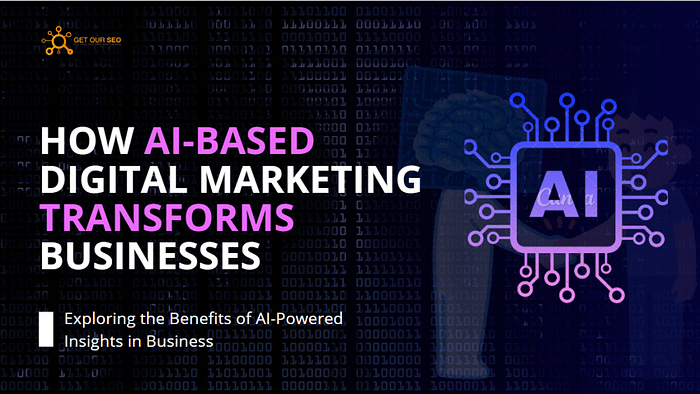In today’s fast-paced digital landscape, businesses are constantly seeking innovative ways to stay ahead of the curve and maximize their online presence. One such revolutionary approach that has been reshaping the marketing realm is AI-based digital marketing. By harnessing the power of artificial intelligence (AI), businesses can now supercharge their marketing strategies, unlocking a plethora of benefits and opportunities. In this article, we delve into the transformative impact of AI-based digital marketing and how it is revolutionizing the way businesses connect with their audience and drive growth.

In this digital age, traditional marketing techniques are no longer sufficient to meet the evolving demands of consumers. Enter AI-based digital marketing, a game-changing paradigm that leverages cutting-edge technologies to optimize marketing efforts and drive tangible results. But what exactly is AI-based digital marketing, and why is it garnering so much attention?
What is AI-Based Digital Marketing?
Definition: At its core, AI-based digital marketing refers to the use of artificial intelligence and machine learning algorithms to streamline and enhance various marketing processes, from audience targeting to content personalization.
Importance: The significance of AI-based digital marketing lies in its ability to analyze vast amounts of data in real-time, enabling marketers to glean actionable insights and deliver hyper-targeted campaigns that resonate with their audience on a deeper level.
Key Components of AI-Based Digital Marketing
AI-based digital marketing relies on several key components to drive its efficacy:
Machine Learning: By harnessing the power of machine learning algorithms, marketers can automate tasks such as predictive analytics, customer segmentation, and personalized recommendations, thereby optimizing campaign performance and driving ROI.
Natural Language Processing (NLP): NLP enables machines to understand and interpret human language, allowing marketers to analyze customer sentiments, extract meaningful insights from social media conversations, and create compelling, engaging content tailored to their audience’s preferences.
Predictive Analytics: Through predictive analytics, businesses can forecast future trends, anticipate customer behavior, and optimize marketing strategies in real-time, ensuring maximum impact and ROI.
Benefits of AI-Based Digital Marketing
The adoption of AI-based digital marketing offers a myriad of benefits for businesses, including:
Enhanced Personalization: AI empowers marketers to deliver highly personalized experiences to their target audience, based on individual preferences, behaviors, and past interactions, fostering stronger customer relationships and driving brand loyalty.
Improved Targeting: By leveraging AI-powered algorithms, businesses can precisely target their ideal customers with relevant content and offers, minimizing waste and maximizing campaign effectiveness.
Increased Efficiency: AI automates repetitive tasks, such as data analysis, A/B testing, and campaign optimization, freeing up valuable time and resources for marketers to focus on strategy and creativity.
Better Decision Making: With access to real-time data and predictive insights, marketers can make informed decisions quickly, mitigating risks and capitalizing on emerging opportunities in the ever-changing digital landscape.
Challenges and Considerations
However, despite its myriad benefits, AI-based digital marketing comes with its own set of challenges and considerations:
Data Privacy Concerns: The collection and analysis of vast amounts of consumer data raise privacy concerns, necessitating stringent measures to ensure compliance with data protection regulations and safeguard consumer privacy.
Algorithm Bias: AI algorithms are susceptible to bias, which can lead to discriminatory outcomes and undermine the credibility of marketing efforts. It’s crucial for businesses to mitigate bias by regularly auditing and refining their algorithms to ensure fairness and transparency.
Technical Complexity: Implementing AI-based digital marketing strategies requires specialized skills and expertise, posing challenges for businesses that lack the necessary resources or technical know-how to harness AI effectively.
Case Studies
Let’s explore some real-world examples of how AI-based digital marketing is transforming businesses across various industries:
Retail Sector: Retail giants like Amazon leverage AI algorithms to analyze customer browsing patterns, predict purchase behavior, and deliver personalized product recommendations, resulting in increased sales and customer satisfaction.
E-commerce Industry: Online retailers use AI-powered chatbots to provide instant customer support, recommend products, and streamline the shopping experience, driving conversions and reducing cart abandonment rates.
Service-Based Businesses: Service-based businesses, such as banks and insurance companies, utilize AI-driven chatbots and virtual assistants to automate customer inquiries, process transactions, and deliver personalized financial advice, enhancing customer engagement and retention.
Future Trends
Looking ahead, the future of AI-based digital marketing is ripe with exciting possibilities:
AI-Driven Automation: As AI technology continues to advance, we can expect to see increased automation across all facets of digital marketing, from content creation and email marketing to ad targeting and campaign optimization, empowering businesses to operate more efficiently and effectively.
Integration with IoT: The integration of AI with Internet of Things (IoT) devices opens up new avenues for data collection and analysis, enabling marketers to gain deeper insights into consumer behavior and deliver personalized experiences across multiple touchpoints.
Conclusion
In conclusion, AI-based digital marketing represents a seismic shift in the way businesses approach marketing and customer engagement. By harnessing the power of artificial intelligence, businesses can unlock unprecedented levels of personalization, efficiency, and effectiveness in their marketing efforts, driving growth and staying ahead of the competition in today’s digital landscape.
Welcome to the GetOurSEO.com Blog, your hub for expert insights and actionable tips in digital marketing. Explore strategies across SEO, PPC, content marketing, and social media to enhance your online presence.
Why Choose GetOurSEO?
We provide tailored strategies to align with your business goals, supported by a skilled team that ensures measurable results and exceptional ROI. Offering a full suite of services, including SEO, market analysis, and social media management, we prioritize customer satisfaction and long-term partnerships. Trusted by businesses worldwide, including in India, the UK, the USA, and Australia, we’re here to help you thrive in the competitive digital landscape.
Discover how GetOurSEO can take your business to new heights.
FAQs
1. How does AI-based digital marketing impact small businesses?
AI-based digital marketing levels the playing field for small businesses by enabling them to compete with larger counterparts on a more equal footing, thanks to its affordability and scalability.
2. What are some ethical considerations associated with AI-based digital marketing?
Ethical considerations include concerns about data privacy, algorithm bias, and the potential for AI to perpetuate harmful stereotypes or discriminatory practices if not properly regulated and monitored.
3. Can AI completely replace human marketers?
While AI can automate many routine tasks and optimize campaign performance, human creativity, intuition, and empathy remain irreplaceable assets in the marketing process, especially when it comes to crafting compelling storytelling and building genuine connections with customers.
4. How can businesses ensure the ethical use of AI in their marketing strategies?
Businesses can ensure the ethical use of AI by prioritizing transparency, accountability, and fairness in their algorithms, implementing robust data governance frameworks, and regularly auditing their AI systems for bias and unintended consequences.
5. What role does AI play in content marketing?
AI enhances content marketing by facilitating content creation, curation, and optimization, enabling marketers to produce high-quality, relevant content at scale, tailored to the preferences and interests of their target audience.

